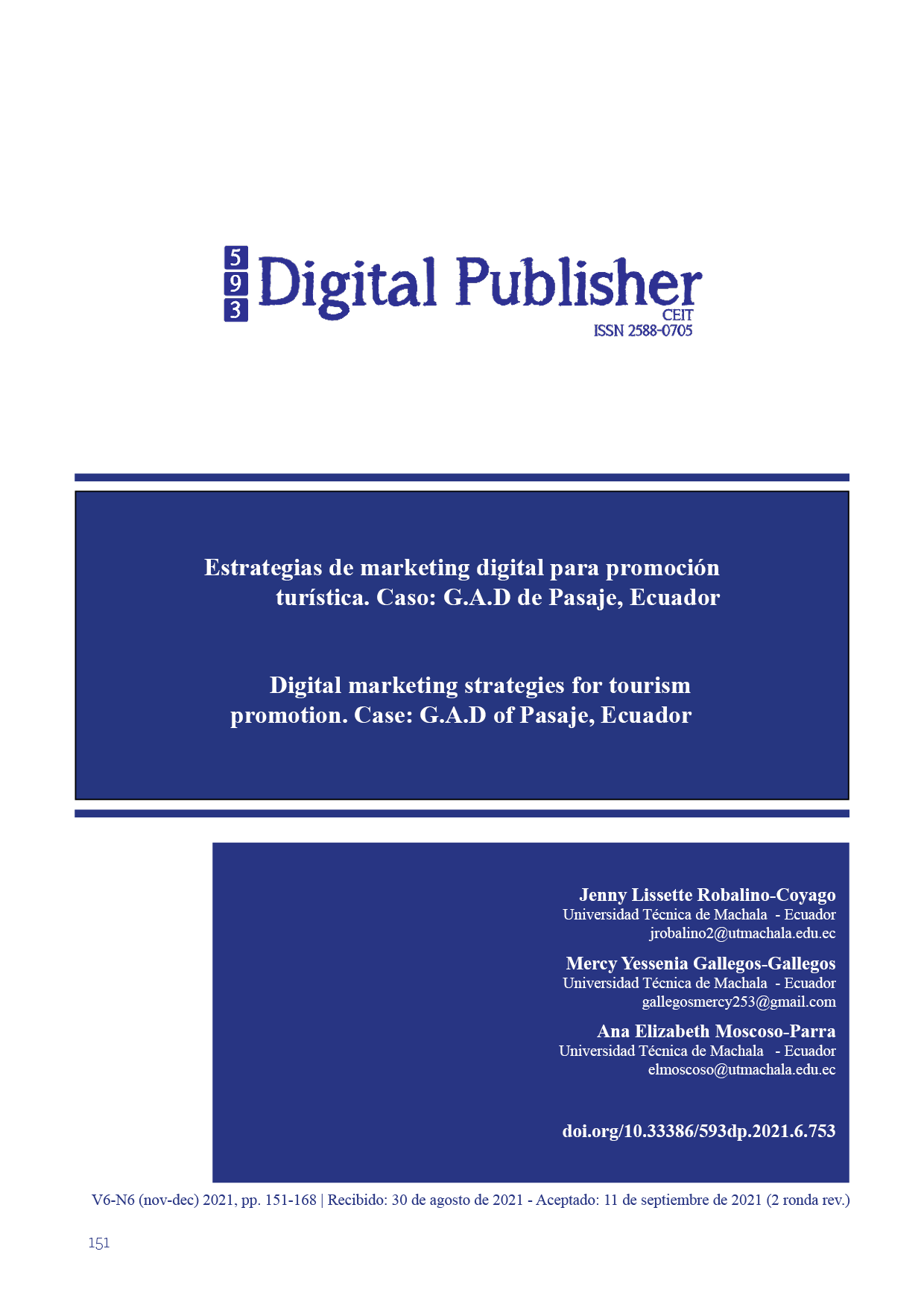Digital marketing strategies for tourism promotion. Case: G.A.D of Pasaje, Ecuador
Main Article Content
Abstract
Digital marketing strategies so far have contributed very well in the tourism development of several cantons, since they take advantage of the impact that social networks have being a mass digital media, making it possible to create a community and get the followers to relate and interact immediately from the content published. The objective of this article is to know and analyze the digital marketing tools used for the tourism promotion of the canton Pasaje. The methodology used is of qualitative type employed in the bibliographic review of scientific articles, the interview to the person in charge of tourism promotion in order to know how the process of promotion of tourist sites is planned and developed and finally the observation to determine the main aspects on the management of promotional content of tourist sites on the website and social networks using an observation guide according to the variables and indicators of each platform. The results show that the social network that has more followers by users is Facebook, but it should be noted that they do not make frequent publications which only get that it does not have a high persuasion in users. Even more with the results obtained, it seeks to motivate this type of sector on the importance of implementing digital strategies in different social platforms in order to attract more visitors and be competitive in the market.
Downloads
Article Details

This work is licensed under a Creative Commons Attribution-NonCommercial-ShareAlike 4.0 International License.
1. Derechos de autor
Las obras que se publican en 593 Digital Publisher CEIT están sujetas a los siguientes términos:
1.1. 593 Digital Publisher CEIT, conserva los derechos patrimoniales (copyright) de las obras publicadas, favorece y permite la reutilización de las mismas bajo la licencia Licencia Creative Commons 4.0 de Reconocimiento-NoComercial-CompartirIgual 4.0, por lo cual se pueden copiar, usar, difundir, transmitir y exponer públicamente, siempre que:
1.1.a. Se cite la autoría y fuente original de su publicación (revista, editorial, URL).
1.1.b. No se usen para fines comerciales u onerosos.
1.1.c. Se mencione la existencia y especificaciones de esta licencia de uso.
References
Ballesteros, L., Silva, F., Mena, D., & Angamarca, M. (junio de 2019). Estrategias de Marketing Digital en Empresas E-Commerce: Un acercamiento a la perspectiva del consumidor. Digital Publisher, 111. doi:2588-0705
Claudia, G., & Martínez , S. (2017). ANÁLISIS DE LA ACTIVIDAD Y PRESENCIA EN FACEBOOK Y OTRAS REDES SOCIALES DE LOS PORTALES TURÍSTICOS DE LAS COMUNIDADES AUTÓNOMAS ESPAÑOLAS. Cuadernos Turismo(39), 249. doi:http://dx.doi.org/10.6018/turismo.39.290521
Diario Correo. (29 de septiembre de 2020). Plan Maestro busca fortalecer el turismo interno en El Oro. Recuperado el 2021, de https://www.diariocorreo.com.ec/47452/ciudad/plan-maestro-busca-fortalecer-el-turismo-interno-en-el-oro
Espinoza, E. (2020). La investigación cualitativa, una herramienta ética en el ámbito pedagógico. Scielo, 16(75), 104-105. Recuperado el 2021, de http://scielo.sld.cu/scielo.php?script=sci_arttext&pid=S1990-86442020000400103
Fassio, A. (2017). REFLEXIONES ACERCA DE LA METODOLOGIA CUALITATIVA PARA EL ESTUDIO DE LAS ORGANIZACIONES. DIGITAL FCE CIENCAS ADMINISTRATIVAS, 105. Recuperado el agosto, de http://sedici.unlp.edu.ar/bitstream/handle/10915/67787/Documento_completo.pdf-PDFA.pdf?sequence=1&isAllowed=y
Félix, A., & Garcia, N. (2020). Estudio de pérdidas y estrategias de reactivación para el sector turístico por crisis sanitaria COVID-19 en el destino Manta-Ecuador. REVISTA INTERNACIONAL DE TURISMO, EMPRESA Y TERRITORIO(7). Recuperado el 2021, de file:///C:/Users/HP/Downloads/Dialnet-EstudioDePerdidasYEstrategiasDeReactivacionParaElS-7483989%20(1).pdf
Hernández, K., Yanez, J., & Carrera, A. (2017). LAS REDES SOCIALES Y ADOLESCENCIAS. REPERCUSIÓN EN LA ACTIVIDAD FÍSICA. Scielo, 9(2), 243. Recuperado el julio de 2021, de http://scielo.sld.cu/scielo.php?script=sci_arttext&pid=S2218-36202017000200033
Iño, W. (2018). Investigación educativa desde un enfoque cualitativo: la historia oral como método. Voces De La Educación, 3(6), 93-110. Obtenido de https://www.revista.vocesdelaeducacion.com.mx/index.php/voces/article/view/123/110
Morales, A. (2020). Relaciones en tiempos de pandemia: COVID-19 y bienestar animal, ambiental y humano. Revista Facultad Nacional de Agronomía Medellín. Recuperado el 2021, de https://revistaespacios.com/a20v41n42/a20v41n42p17.pdf
Municipio Pasaje. (agosto de 2013). Recuperado el 2021, de Pasaje de las Nieves: https://municipiodepasaje.gob.ec/
Perdigón, R., & Viltres, H. (2021). SOCIAL MEDIA MARKETING EN EMPRESAS AGRÍCOLAS CUBANAS. TENDENCIAS, XXII(2), 167-168. doi:https://doi.org/10.22267/rtend.202102.159
Pincay, J., Caicedo, V., Herrera, J., & Delgado, W. (2020). Usabilidad en sitios web oficiales de las universidades del Ecuador. Revista Ibérica de Sistemas e Tecnologias de Información(E29), 107. Recuperado el 2021, de https://www.proquest.com/openview/6d12f06cb84b74903a469f2b388d6bc1/1?pq-origsite=gscholar&cbl=1006393
Piza, N., Amaiquema, F., & Beltrán, G. (2019). Métodos y técnicas en la investigación cualitativa. Algunas precisiones necesarias. Revista Conrado, 15(70), 455-459. Obtenido de http://scielo.sld.cu/pdf/rc/v15n70/1990-8644-rc-15-70-455.pdf
Ponce, J. P. (Enero de 2021). Obtenido de Ecuador Estado Digital: https://es.slideshare.net/jpdelal/ecuador-estado-digital-estadsticas-digitales-enero-2019
Ramos, N., Fernández, A., & Almodóvar , M. (enero-junio de 2020). El uso de estrategias de marketing digital para la promoción turistica de las comunidades autónomas españolas. aDResearchESIC, 21(21), 30-33. Recuperado el Julio de 2021, de file:///C:/Users/HP/Downloads/Dialnet-ElUsoDeEstrategiasDeMarketingDigitalParaLaPromocio-7216087%20(2).pdf
Sánchez, F. (2019). Fundamentos epistémicos de la investigación cualitativa y cuantitativa: Consensos y disensos. Revista Digital Investigación Docencia Universitaria, 3(1), 104. Recuperado el 2021, de http://www.scielo.org.pe/scielo.php?script=sci_arttext&pid=S2223-25162019000100008
Sotomayor, M. F. (2018). Propuesta de difusión turística mediante herramientas web y estrategias de marketing digital. Caso de estudio: cantón Loja, Ecuador. 70. Recuperado el julio de 2021, de https://revistadigital.uce.edu.ec/index.php/SIE%20MBRA/article/view/1717/1672%20)
UNESCO. (2018). La UNESCO lanza la nueva plataforma “Viajes del Patrimonio Mundial” para promover el turismo sostenible en la UE. Recuperado el 2021, de https://es.unesco.org/news/unesco-lanza-nueva-plataforma-viajes-del-patrimonio-mundial-promover-turismo-sostenible-ue
Verdecia, A. (julio-septiembre de 2018). “TENDENCIAS DEL CONSUMIDOR DIGITAL PARA EL PRODUCTO TURÍSTICO”. Revista Granmense de Desarrollo Local., 2(3). Recuperado el julio de 2021, de https://revistas.udg.co.cu/index.php/redel/article/view/136/200
Vergara, H., Rivera, A. L., Paula, P., & Ramos, R. (2020). Las estrategias digitales y su incidencia en el turismo. España: FORUM XXI. doi:978-84-09-17043-2




